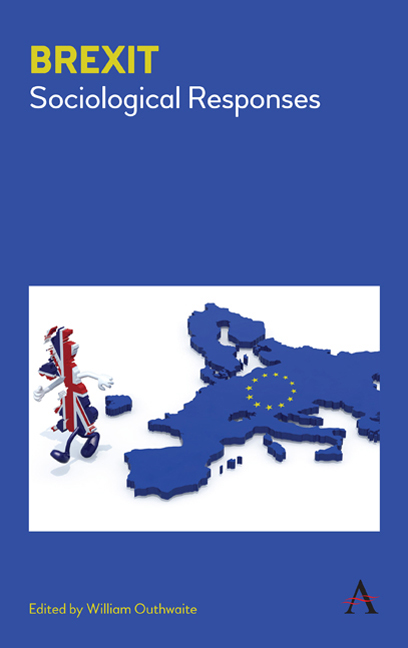Book contents
- Frontmatter
- Contents
- Preface
- Section 1 HOW DID IT HAPPEN?
- Section 2 THE POLITICS OF BREXIT
- Chapter Five Populism, Nationalism and Brexit
- Chapter Six A Tale of Two Constitutions: Whose Legitimacy? Whose Crisis?
- Chapter Seven Locating Brexit in the Pragmatics of Race, Citizenship and Empire
- Chapter Eight Globalization, Nationalism and the Changing Axes of Political Identity
- Chapter Nine A Divided Nation in a Divided Europe: Emerging Cleavages and the Crisis of European Integration
- Section 3 PROSPECTS FOR/ AFTER BREXIT
- Notes on Contributors
- Index
Chapter Six - A Tale of Two Constitutions: Whose Legitimacy? Whose Crisis?
from Section 2 - THE POLITICS OF BREXIT
Published online by Cambridge University Press: 10 January 2018
- Frontmatter
- Contents
- Preface
- Section 1 HOW DID IT HAPPEN?
- Section 2 THE POLITICS OF BREXIT
- Chapter Five Populism, Nationalism and Brexit
- Chapter Six A Tale of Two Constitutions: Whose Legitimacy? Whose Crisis?
- Chapter Seven Locating Brexit in the Pragmatics of Race, Citizenship and Empire
- Chapter Eight Globalization, Nationalism and the Changing Axes of Political Identity
- Chapter Nine A Divided Nation in a Divided Europe: Emerging Cleavages and the Crisis of European Integration
- Section 3 PROSPECTS FOR/ AFTER BREXIT
- Notes on Contributors
- Index
Summary
An Illness with a Cure
Two rather improbably connected lines of theoretical reflection on constitutional crises converged in debates attached to the referendum held in June 2016 that eventually, we assume, will lead to Britain's withdrawal from the European Union (EU). In fact, although surrounded on a day- to- day basis by a combination of slovenly self- interest and strategic deception, the Brexit referendum has a surprisingly high constitutional pedigree.
First, the decision by David Cameron to call a referendum on the UK's membership of the EU was shaped, at least rhetorically, by a broad sense, across the whole of Europe (and beyond), that the EU lacked legitimacy, and that it was not supported by a demos able to infuse its laws and institutions with popular authority and grounds for popular recognition. This view has been widely shouted at street level. Over many years prior to the Brexit campaign, however, it also provided good service for academic career building. Indeed, a minor industry had developed around the sceptical analysis of the legitimational foundations of the EU, and around the attempt to show how the EU might lay claim to resources of legitimacy more closely patterned on those of which, it is presumed, classical national states avail themselves.
It is not possible here to canvass all the opinions that feature in these debates. Broadly, however, critical analyses of the legitimational order of the EU follow two distinct lines of argument. On the one hand, many observers place a critical emphasis on the seeming opacity of the institutions involved in the European integration process. In particular, they criticize the committee structures and the judicial institutions that have contributed to the development of the European legal order. On the latter point, many observers argue that the constitutional order of the EU has been created, in essence, by non- mandated judicial actors. For this outlook, the system of public law in the EU has been primarily created by the European Court of Justice (ECJ), acting de facto as a Constitutional Court in comity with national courts. However, it is also suggested that the European Court of Human Rights (ECtHR) has had some hand in this process.
- Type
- Chapter
- Information
- BrexitSociological Responses, pp. 77 - 90Publisher: Anthem PressPrint publication year: 2017



